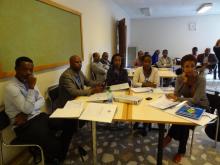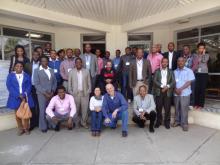Tuberculosis Programme Managers' Capacity Strengthened through WHO Training Course
A WHO training course fortuberculosis (TB) control programme managers organized by the World Health Organization Ethiopia Country Office and the Federal Ministry of Health took place during 24 November to 5 December at the ALERT Training Center in Addis Ababa.
The objective of the training course was to further develop the necessary skills to plan, implement and evaluate a TB Control Programme in the MDS/XDR era, based on the WHO-recommended strategy, with a special focus towards the new post-2015 global TB Control and Elimination Strategy. The training also aimed to address gaps identified during the National TB Programme Review conducted in 2013. The Review identified that central-level as well as regional level staff of the TB Control Programme need training to improve their program management skill and to get up to speed with new developments in TB control approaches.
Tuberculosis (TB) is second only to HIV/AIDS as the greatest killer worldwide due to a single infectious agent. In 2013, 9 million people fell ill with TB and 1.5 million died from the disease. Moreover, over 95% of TB deaths occur in low- and middle-income countries, and it is among the top 5 causes of death for women aged 15 to 44. TB is also a leading killer of HIV-positive people causing one fourth of all HIV-related deaths.
The Ethiopian Ministry of Health's TB/Leprosy Control Program aims to increase the demand for TB/Leprosy care by raising community awareness through advocacy communication, social mobilization and other integration via the Health Extension Programme. The three TB prevention and control indicators include TB case detection rate, TB treatment success rate and TB cure rate. Overall, this programme is maintaining high levels of treatment success and cure rate. Once put on TB treatment, adherence of patients to the treatment is satisfactory (Source: FMoH website).
The training was conducted by trainers from the WHO Collaborating Centre for Tuberculosis and Lung Diseases based Tradate, Italy, through its staff, the Director of the Centre, Professor Migliori Giobanni Battista and Senior Training Officer, Dr D Ambrosio Lia together with Prof Sotgiv Giovanni, a Clinical Epidemiologist and an expert in Medical Statistics from the University of Sossau, Italy.
TB programme managers and case team leaders from five regional health bureaus attended the training.
For more information, please contact: Dr Esther Aceng, HIV/AIDS and TB, Leprosy and Malaria Programme Coordinator, WHO Ethiopia; Email: acenge [at] who.int (acenge[at]who[dot]int)
Photos: WHO Ethiopia/ Loza Mesfin Tesfaye






